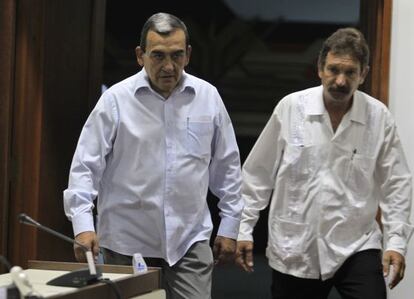Colombian leader confirms peace talks with long-running insurgency
Santos vows to continue fight against FARC until negotiations are complete

In an historic move, Colombian President Juan Manuel Santos officially announced on Tuesday that his government will begin peace negotiations with the Marxist group the Revolutionary Armed Forces of Colombia (FARC), which has been waging an armed insurgency for nearly half a century.
"We will initiate the General Agreement to End the Conflict in Colombia so that the sons of this same nation will stop killing one another," Santos said during a news conference at the Casa de Nariño presidential palace in Bogota. The talks will begin in October in Oslo and later continue in Cuba.
Representatives for the Colombian government had been secretly working behind the scenes for nearly two years - including six months of talks with FARC members in Havana - to come up with a five-point plan. While there had been rumors throughout this time, it was only two weeks ago that Santos acknowledged that his administration was on the verge of initiating dialogue.
Santos said that the first phase of peace negotiations has been completed, which entailed a series of meetings to lay down the basis of what will be the ground rules during the next round of talks, "so that this war will end once and for all."
Everyone wants to know what occurred, and who is responsible for this violence"
This will be the fourth time a Colombian government has tried to open talks with the FARC - Latin America's longest-running insurgency - over the past three decades. But the president assured the nation that he will not make any territorial concessions to the guerrillas, nor will the military stop its battle with the insurgents during this time. He also called on Colombians to be patient should there be new attacks by the guerrillas.
Among the five points to be covered in the talks are rural development, with options for poorer Colombians to have access to land, and the development of infrastructure projects. Political rights for the opposition, with guarantees that those who protest will be able to do so without fears of retaliation, will also be discussed, as well as the reintegration of FARC members back into society, drug trafficking, and the rights of victims.
"Everyone wants to know what occurred, and who is responsible for this violence," Santos said.
At a news conference in Havana on Tuesday, FARC rebel force commander Mauricio Jaramillo and other members of the guerilla leadership presented a video of top rebel commander Rodrigo Londoño Echeverry, known as "Timochenko," who said that all Colombians should move on from the conflict. "How much death and destruction, how much pain and tears, how much useless bereavement and abuse, how many lives and smiles must be cut short before we finally conclude that the end to this isn't conflict but civilized dialogue?" he asked, wearing an olive green uniform.
Besides Cuba and Norway, Venezuela and Chile will also step in to help in the peace process. Venezuela and Cuba are governed by leftist presidents, with whom the FARC feels closer aligned, while Chile is governed by a conservative president who is politically aligned to Santos.
The FARC was organized in 1964 with a Marxist ideology, but it has been resorting to drug trafficking and extortion to finance its operations. Although down in numbers, it is thought to have some 8,000 active members.
Tu suscripción se está usando en otro dispositivo
¿Quieres añadir otro usuario a tu suscripción?
Si continúas leyendo en este dispositivo, no se podrá leer en el otro.
FlechaTu suscripción se está usando en otro dispositivo y solo puedes acceder a EL PAÍS desde un dispositivo a la vez.
Si quieres compartir tu cuenta, cambia tu suscripción a la modalidad Premium, así podrás añadir otro usuario. Cada uno accederá con su propia cuenta de email, lo que os permitirá personalizar vuestra experiencia en EL PAÍS.
¿Tienes una suscripción de empresa? Accede aquí para contratar más cuentas.
En el caso de no saber quién está usando tu cuenta, te recomendamos cambiar tu contraseña aquí.
Si decides continuar compartiendo tu cuenta, este mensaje se mostrará en tu dispositivo y en el de la otra persona que está usando tu cuenta de forma indefinida, afectando a tu experiencia de lectura. Puedes consultar aquí los términos y condiciones de la suscripción digital.








































